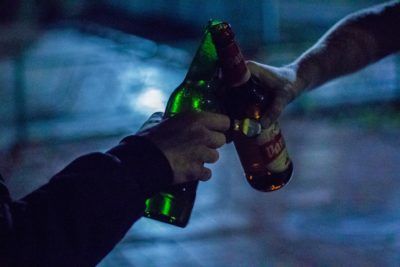 In Nebraska, a person under 21 cannot legally possess alcohol.
In Nebraska, a person under 21 cannot legally possess alcohol.
Getting caught as a minor in possession of alcohol can cause serious legal problems with long-lasting detrimental effects.
Given what is at stake, you might wonder, How long does a minor in possession stay on your record?
Suppose you have been charged as a minor possessing alcohol.
In that case, you need a skilled and experienced defense lawyer to help avoid the severe consequences that could hinder your personal and professional development.
Don’t take a chance by trying to handle the case yourself. Instead, call me right away to discuss your options. The professionals at Petersen Criminal Defense Law are committed to protecting your liberty and future.
Call today to schedule a free consultation.
Does Minor in Possession Stay on Your Record?
Nebraska law does not allow anyone to expunge or eliminate their criminal record. Instead, you could follow the process to “set aside” your conviction.
You will still have a criminal record if you successfully petition the court to set aside your conviction. However, your record will reflect that a court set aside your conviction.
If you are under age 18, you can ask for the case to be transferred to juvenile court. After successful completion of juvenile court, you can ask the court to seal your record.
Sealing is different from expunging, as sealing your record means the record still exists, but the public cannot see it except under limited circumstances.
You might not even know you have a criminal record. In Nebraska, you will have a criminal history if you submit to fingerprinting after an arrest as an adult.
Even then, the arresting agency, unless it was the State Patrol, must send your fingerprint card to the Nebraska State Patrol to add to the state database.
You might ask, What can someone learn about me from my background check? Criminal records are public records in Nebraska. That means anyone can see your criminal history except in three instances.
Those instances are:
- One year passed from the date of arrest if the prosecuting attorney chose not to prosecute;
- Two years from the date of your arrest if you complete pretrial diversion and the prosecutor did not file charges; and
- Immediately if the court dismisses your charges based on the prosecutor’s motion or your completion of a court-ordered program.
Having an attorney fighting for you could help you avoid prosecution, even if the police arrested and fingerprinted you.
Why Is Having a Clean Record Important?
Having a clean criminal record is important for many reasons. Employers, schools, occupational licensing boards, and other institutions run background checks on people.
You could be disadvantaged if you have an arrest, adjudication, or conviction on your record. As a result, you may have difficulty getting the job you want, advancing in your career, and applying for higher education.
Also, you may not receive the security clearance needed for certain occupations.
Even for a charge like a minor in possession, you still have to explain what happened and what punishment you received. In other words, you could end up feeling like you will always have that charge hanging over your head.
What Is Minor in Possession?
Section 53-180.02 of the Nebraska Revised Statutes prohibits minors—i.e., anyone under 21 years of age—from selling, dispensing, consuming, or having possession of any alcohol in a public place.
Public places include restaurants, taverns, streets, alleys, roads, highways, and public property. However, a minor can consume alcohol as part of a religious rite or in their permanent residence.
What Are the Minor in Possession Penalties?
The penalties for minors in possession depend on your age. You face Class III misdemeanor punishment if you are between 18 and 21. A Class III misdemeanor may be punished by three months in jail and a fine of up to $500.
The penalties are slightly different if you are younger than 18. The charge remains a Class III misdemeanor.
However, the court can impound your driver’s license or driving permit for up to 30 days and order you to attend an alcohol education class.
The court could prohibit you from receiving your license or permit for 30 days after the court makes the order. The judge can also make you complete an alcohol education class.
Do You Have Additional Questions?
Call me right away at 402-512-5957 for a free consultation. I will review your best defenses with you and develop an effective legal strategy.
My firm and I always protect your best interests in and out of court and ensure you can access us whenever you need us.


